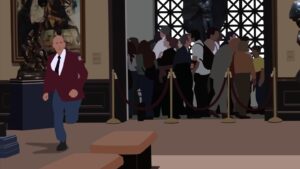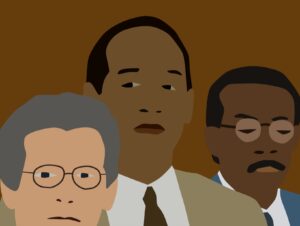August 14, 2025 – February 15, 2026
Goodman Gallery

Kota Ezawa (German, active United States, b. 1969), still from The Crime of Art, 2017, video. Courtesy of the artist.
Kota Ezawa is known for reworking imagery from popular culture, film, and art history into digital animations. Using a labor-intensive process of digitally hand-drawing each frame of his source material, Ezawa transforms his subjects into flattened, stylized animations that feel at once familiar and strangely distant. By distilling forms and content into their basic visual essence, the artist invites reflection on how images shape our understanding of complex events and frame cultural narratives, prompting us to consider how history is constructed, consumed, and remembered.

Kota Ezawa, still from The Simpson Verdict, 2002, video. Courtesy of the artist.
Ezawa’s The Simpson Verdict (2002) reimagines one of the most infamous moments in American legal and media history: the 1995 acquittal of O.J. Simpson, which exposed deep fissures in American society. In The Crime of Art (2017), Ezawa examines real and fictional art heists, critiquing the art world’s contradictions, where priceless works are simultaneously venerated and commodified as mere currency in a global market.
The Museum’s Video Art Series is made possible by the generosity of Francie Bishop Good and David Horvitz.
Image at top: Kota Ezawa (German, active United States, b. 1969), still from The Crime of Art, 2017, video. Courtesy of the artist.

